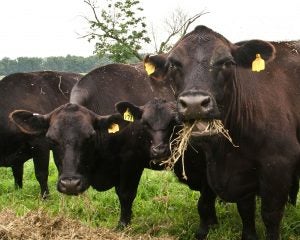American Farmland Trust and partner organizations are being awarded a $30 million grant from the U.S. Department of Agriculture’s Partnerships for Climate-Smart Commodities to spearhead an effort to transition the U.S. Beef Supply Chain to carbon neutral. The eight-state project will amplify production of climate-smart beef by expanding market drivers, grassroots support networks, and early adopter mentors, while also providing technical assistance for the adoption of climate-smart grazing practices to substantially reduce agricultural greenhouse gas emissions and increase carbon sequestration.
The funding is part of a broader $2.8 billion investment announced this week through the USDA, one that many say is urgently needed in today’s agricultural climate. In all, 70 projects have been selected, covering a range of market access, soil health initiatives, infrastructure improvements, and conservation approaches.
AFT’s project will help produce climate-smart beef for all market levels — from direct sales through local farmers markets to regional distribution channels to national and global consumer-facing food companies. The project team will engage and train more than 50 producer mentors, transition more than 750 beef producers, map and increase soil function on about 600,000 acres and permanently protect at least 3,000 to 4,500 acres of threatened farmland.
“We anticipate being able to sequester at least 1 million to 5 million tons of CO2e during the five-year project, but more importantly we project self-sustaining and accelerating expansion of climate smart system adoption and stable, broadly available verified climate smart marketing opportunities beyond the end of USDA funding,” said Bianca Moebius-Clune, AFT’s Climate Initiative Director and Principal Investigator.
AFT and its partners will provide a range of virtual and in-person outreach and training. It will further help interested landowners and local land trusts explore options for farmland protection that directly reinforce climate-smart systems adoption.
“This effort is critical in transitioning the country’s U.S. beef supply chain to one that is more environmentally friendly,” said Beth Sauerhaft, AFT Vice President of Programs. “Beyond this, we will support farmers in protecting their land through permanent easements to help ensure that the soil health and climate benefits from those practices continue far into the future.”
In addition to AFT, project partners include The Integrity Beef Alliance, Indigo Agriculture, Earth Optics, Freedman Heirs Foundation, AgriWebb, Regenified, OpenTEAM, U.S. Biochar Initiative and many regional and community-based partners.

Other pieces of the $2.8 billion from the USDA are going to organizations such as Edge Dairy Farmer Cooperative, one of the largest dairy co-ops in the country, which will receive up to $50 million to work toward even better sustainability in an evolving marketplace.
Truterra, the sustainability business of Land O’Lakes, leads a $90 million grant to engage up to 20,000 farmers and dairy producers (with a focus on engaging historically underserved farmers) in hopes to reduce greenhouse gas (GHG) emissions by approximately 7.2 million metric tons CO2e- roughly the equivalent of taking 1.5 million cars off the road for a year.
There will also be $95 million going toward the National Fish & Wildlife Foundation and Farmers for Soil Health — a coalition of the National Corn Growers Association, the United Soybean Board, and the National Pork Board — to help growers accelerate cover crop adoption.
“We are appreciative of the USDA for recognizing the important role farmers play in combatting climate change,” said Nathan Fields, National Corn Growers Association Vice President of Production and Sustainability. “These funds will help us identify and support practices that work for corn growers, expand the use of cover crops and build on our efforts to lower greenhouse gas emissions.”


